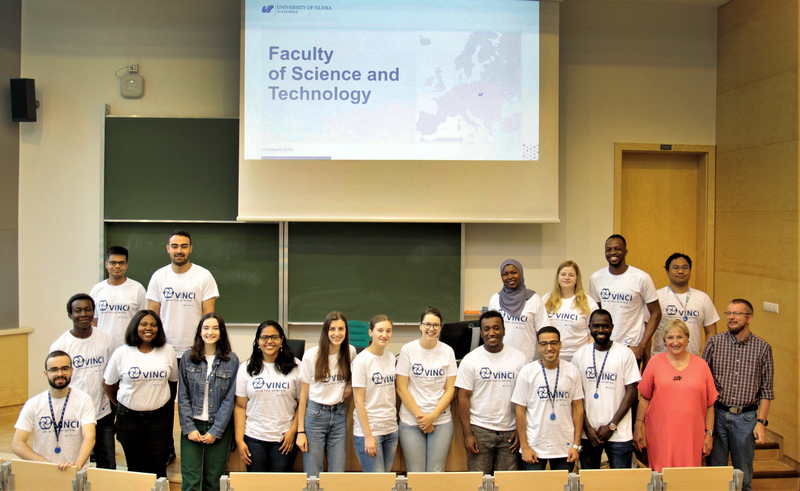Thanks to its outstanding research teams and well-equipped laboratories, the University of Silesia actively participates in European Commission initiatives aimed at educational and scientific development. The Faculty of Science and Technology launched an interdisciplinary international summer school as part of the programme entitled SPINAKER — intensive international education programmes (NAWA), inviting 1st and 2nd cycle students of exact science and technology degree programmes from abroad. From 4 to 22 July 2022, they participated in an intensive three-week course in their chosen discipline (physics, chemistry, computer science and materials engineering).

Photo by Tomasz Grząślewiecz
Inauguration of the VINCI Interdisciplinary International Silesian Summer School
The VINCI Dive into Science — Interdisciplinary International Silesian Summer School project provides education that includes basic classes, specialised workshops involving scientific research, lectures delivered by foreign professors, seminars, and classes promoting Polish culture. Students attended 18 hours of on-site lectures with USil scientists and 8 hours of online lectures with scientists from foreign universities. Equipped with theoretical knowledge, they continued their research training during 30 hours of specialised workshops carried out individually in modern laboratories, using unique equipment and under the supervision of scientists from the faculty. By working individually with the student, the research team has a chance to get the student interested in the topic and encourage further cooperation, while the student has the opportunity to get to know the technical aspects of the researcher’s work already at such an early stage of education. The result of the cooperation is the scientific research conducted.
In addition to 56 hours of lectures, students have the opportunity to learn about the latest trends in research conducted in the fields of computer science, chemistry, physics, and materials engineering by attending a seminar presenting the institutions involved in the project, namely the Institutes of Chemistry, Physics, Computer Science, and Materials Engineering. The seminar closing the three-week course is extremely important in terms of the project’s objective. It allows the students and the scientists working with them to recognise the scientific development they have achieved by presenting the results of their scientific work within their chosen topic. During the final seminar, each student presented the goal of their research, their motivation, the specifics of the experiments conducted, and the preliminary results obtained. The programme also includes optional field trips, including an excursion to the SOLARIS Centre providing an opportunity to learn about Poland’s scientific and research capabilities. Students learn about Poland and Polish culture during classes conducted at the School of Polish Language and Culture.
All classes are conducted in English and take place in modern classrooms and laboratories located in Katowice, Chorzów, and Sosnowiec, including the following laboratories: structural research, X-ray, differential scanning calorimetry, magnetic research, computer simulation lab, and many others. The people involved in the project have extensive teaching and research experience, are authors of many scientific publications and research projects, and are involved in national and international cooperation with higher education, research, and business-related institutions.
The first edition of the summer school (the programme is expected to have two editions) was attended by students from countries such as Mexico, Italy, Serbia, the Czech Republic, Lithuania, Spain, the United States, Nigeria, and Uganda. In a survey summarising the experience, the participants appreciated the highly qualified academics, the opportunity to learn about the latest trends in research, individual work in a research team, as well as the pleasant and friendly atmosphere at our Alma Mater. They declared an intention to pursue further education in their chosen field. We believe that we will see them among the students or doctoral students of our University in the coming years. The second edition of the school will take place in 2023. We trust that this project will allow us to improve internationalisation and promote our research abroad.






